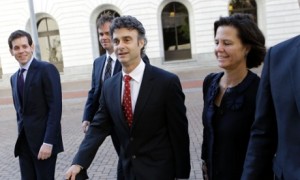
Kurt Mix, centre, arrives with his legal team at Federal Court in New Orleans, Wednesday, Dec. 18, 2013, to hear the jury’s guilty verdict on one charge that he deleted text messages from his cell phone to obstruct a federal investigation of the company’s massive 2010 oil spill in the Gulf of Mexico. He was acquitted of a second charge. A federal jury deliberated for more than nine hours before reaching a verdict. The count of obstruction of justice carries a maximum sentence of 20 years in prison and a $250,000 fine. (AP Photo/Gerald Herbert)
New Orleans, U.S (AP) – A former BP engineer convicted of obstructing a Justice Department probe of the company’s 2010 Gulf oil spill has asked a judge to disqualify himself from the case.
In a court filing late Wednesday, Kurt Mix’s lawyers say they learned last week that U.S. District Judge Stanwood Duval Jr. and his law clerk assigned to the case filed civil claims in April 2013 for compensatory and punitive damages against BP.
Duval had disclosed in 2012 that his family owns a beachfront vacation home in Grand Isle and was entitled to seek compensation from BP. He said then that he didn’t see any reason to disqualify himself from the case. Duval hadn’t changed his position before Tuesday, when he instructed Mix’s lawyers to put their recusal request in writing.
Defence attorneys argue Duval must disqualify himself before ruling on their request for a new trial for Mix, who was convicted last month of obstruction of justice for deleting text messages to and from a BP supervisor.
Mix and the public shouldn’t be “left to wonder” whether Duval already had “chosen up sides in factual disputes that the prosecution made central to Mr. Mix’s case” and decided to punish Mix if he got the chance, defence lawyers argued.
“Even if the court is not actually biased against Mr. Mix or the arguments he advanced at trial (or biased in favour of the arguments the prosecution advanced at trial), the mere fact that a reasonable observer might question the court’s impartiality suffices to trigger” Duval’s recusal, they wrote.
Mix, 52, of Katy, Texas, faces a maximum sentence of 20 years in prison and a $250,000 fine. His sentencing is scheduled for March 26.
After the verdict, Mix’s lawyers asked Duval to throw out the jury’s verdict and order a new trial, citing allegations of juror misconduct. The defence attorneys said they learned that one juror told the others during their deliberations about overhearing a conversation in a courthouse elevator that made that juror feel more comfortable about convicting Mix.


